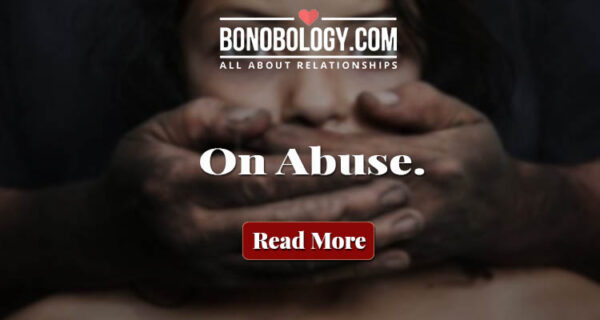Why do people stay in abusive relationships when they can just break things off and start afresh a new life? For someone who has never been in such a relationship, it may seem very strange that a victim would keep on choosing to stay in an abusive relationship.
“Why don’t they just come out of it?” Many of us have asked this question, but the question we never ask is why are people abusive in the first place? What most people fail to realize is that leaving an abusive relationship can be extremely complicated. There are many reasons victims of abuse decide not to leave.
8 Reasons People Stay In An Abusive Relationship
Table of Contents
The reasons for staying in an abusive relationship can range from financial dependence to low self-esteem and confidence, and even being in love with the abuser. The reasons may be shocking to you, but it is completely justified in the eyes of the victim.
So, why do people stay in abusive relationships even when they know they have other alternatives to live a better life? Let us have a look at some of the reasons:
Related Reading: How To Deal With Domestic Abuse During Lockdown
1. Fear of partner
This is one of the most common reasons for victims of abuse to continue staying in an abusive relationship. They are afraid of the consequences of deciding to leave the relationship. They don’t know how their abuser might react.
Be it emotional abuse, verbal or even physical, victims are usually afraid to say anything that may trigger a volatile response from their abusive partner. In some cases, the abuser may even threaten to attack the victim’s family if they try to leave.
2. Embarrassment of splitting
Shame or embarrassment in admitting to being the victim of abuse is also among the top reasons why stay in an abusive relationship. Social taboo and fear of judgment by family and friends can also make a victim stay. No one in our society wants to appear ‘weak’ and victimized, and so they do everything in their power to avoid being seen in that light.

3. Their low self-esteem
Why do people stay in abusive relationships if they are perfectly able to make decisions for themselves? Prolonged emotional and psychological abuse can annihilate the victim’s self-esteem. The abuser makes the victim believe they are worthless and deserve the abuse.
They are made to feel like they won’t be able to live without their partner, and would not get anywhere in life without their support. Choosing to stay in an abusive relationship is actually less of a choice and more compulsion in a victim’s mind.
Related Reading: After two failed marriages, I’ve lost confidence
4. Manipulation by the abuser
Usually, abusers are skilled manipulators and can make the victims of abuse stick to the relationship. They can threaten to commit suicide, blame the victim, or even pretend to be the victims themselves. When a person decides to continue staying in an abusive relationship, they don’t even realize that someone else is making this decision for them.
They know all the signs of an abusive relationship, but abusers are great actors and extremely persuasive in their ways. They can twist the story in their favor. So unless a victim has concrete evidence against their crimes and the right support system, going against them would be very difficult.

5. Financial dependence
Financially abusive relationships are common. In this case, the victim is largely dependent on the abuser for their finances. The abuser tries to control the victim’s financial situation and causes problems if they try to become financially independent.
In many cases, the abuser tricks the victim to get their money, making them largely dependent. The abuser even controls what their victim can or cannot do, and won’t allow anything that goes against their approval.
6. Concern for children
An abuse victim has a harder time coming out of a toxic relationship when children are involved. They consider the future of their children and wait for them to be grown up enough to deal with the trauma that they may face when the truth about one of their parents being abusive eventually comes out.
Divorce and children is a sensitive issue because along with the abuse victim, the children too go through a lot of trauma. Explaining abuse to a child can be very difficult, and parents who are victims of abuse would do anything to protect their child from hearing about it or experiencing it firsthand.
Related Reading: Husband Abused Her When She Said She Wanted To Get Back To Work After A Break
7. Religious/societal barriers
Many victims are forced to stay in an abusive relationship because of religious or social norms. They may fear bringing shame on their family if they choose to walk out of a marriage.
This can be quite a frustrating reason to stay on in such a relationship. When a victim asks themselves, “Why do I choose abusive relationships?” The only answer they have is because of societal pressure. Many conservative communities prefer that women continue staying in abusive relationships rather than divorce someone.
8. Love for the abuser
As unlikely as this may seem to an outsider, many abuse victims have genuinely expressed being in love with their abuser. The victim may want to make the relationship work, despite the abuse.
This phenomenon is known as ‘Stockholm Syndrome’ and it is not as uncommon as you’d think. Many victims fall for their captors and their toxic ways.

There are many answers to the question of why do people stay in abusive relationships, and these 8 points were just the gist of it. Every person’s circumstance is different and the way they react depends on what they are exposed to. If possible, help a victim of abuse in any way that you can. Even a little goes a long way.
FAQs
Abusers are mentally ill, and this illness stems from some childhood trauma that was neglected and is coming out in the form of abuse in their adulthood.
It breaks them down completely and shatters their self-esteem and confidence. They don’t know how to feel normal and happy again.
It goes- enmeshment, extreme overprotection, neglect, rage, and lastly abandonment.
Your contribution does not constitute a charitable donation. It will allow Bonobology to continue bringing you new and up-to-date information in our pursuit of helping anyone in the world to learn how to do anything.
Ask Our Expert
You must be Logged in to ask a question.



Featured
How To Get Over Trust Issues — A Therapist Shares 9 Tips
Learn How To Forgive Yourself For Hurting Someone You Love
How To Find Peace After Being Cheated On — 9 Tips From A Therapist
How To Forgive A Cheating Husband: 15 Helpful Tips
35 Disturbing Signs Of Gaslighting In A Relationship
What Is Narcissistic Ghosting And How To Respond To It
‘My Husband Starts Fights And Then Blames Me’: Ways To Cope
How To Rebuild Your Life After The Death Of A Spouse: 11 Expert-Backed Tips
My Husband Died And I Want Him Back: Coping With Grief
“Am I Unlovable” – 9 Reasons You Feel This Way
11 Signs Your Girlfriend Was Sexually Abused In The Past And How To Help Her
Coping With Breakups: The Must-Have Breakup Apps For Your Phone
13 Heartbreaking Signs You Are Wasting Your Time Trying To Get Your Ex Back
Why Are You Obsessed With Someone You Barely Know — 10 Possible Reasons
33 Phrases To Shut Down Gaslighting And Silence Gaslighters
The Emotion Wheel: What It Is And How To Use It To Build Better Relationships
The Role Of Supportive Relationships In Addiction Recovery
7 Signs You Have A Verbally Abusive Wife And 6 Things You Can Do About It
Mommy Issues In Women – Meaning, Psychology, And Signs
Lovesickness — What Is It, Signs, And How To Cope